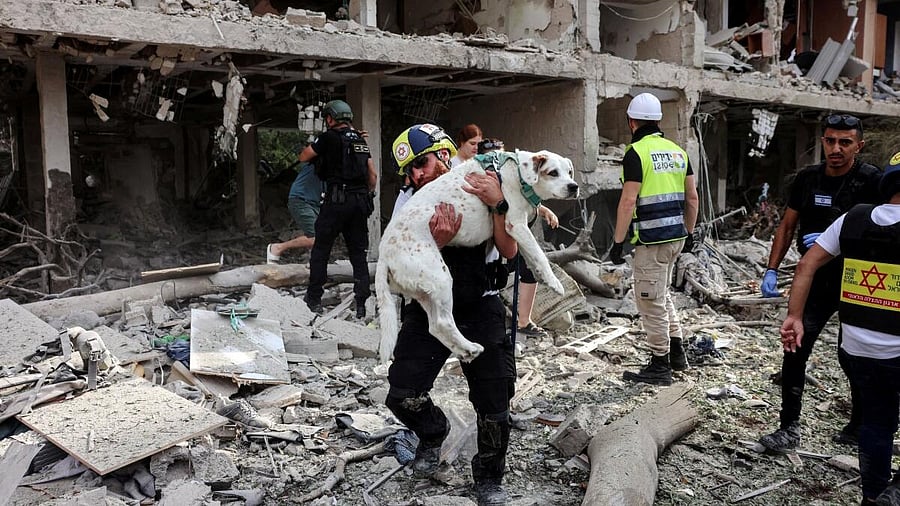
A rescuer evacuates a dog from an impacted site after a missile attack from Iran, amid the Iran-Israel conflict in Tel Aviv, Israel June 22, 2025.
Credit: Reuters Photo
The ongoing conflict between Israel and Iran escalated manifold on Saturday as the United States stepped into it with the American air force's B-2 bombers carrying out targeted strikes on nuclear sites in the Islamic Republic, including the Fordow fuel enrichment plant.
US President Donald Trump on Saturday said that a "very successful attack" on three nuclear sites in Iran had been successfully carried out.
In a post on Truth Social, Trump added, "All planes are safely on their way home" and he congratulated "our great American Warriors."
Track latest updates on West Asia conflict here.
Trump ended his post saying, "Now is the time for peace."
The action came as Israel and Iran have been engaged in more than a week of aerial combat that has resulted in deaths and injuries in both countries.
Israel launched the attacks on Iran saying that it wanted to remove any chance of Tehran developing nuclear weapons.
Here are some key developments in the ongoing conflict since June 13.
June 13: Israel strikes Iran nuclear facilities, missile factories
Israel targeted Iran's nuclear facilities, ballistic missile factories and military commanders on Friday at the start of what it warned would be a prolonged operation to prevent Tehran from building an atomic weapon.
Iranian media and witnesses reported explosions including at the country's main uranium enrichment facility at Natanz, while Israel declared a state of emergency in anticipation of retaliatory missile and drone strikes.
Iranian state television reported that Hossein Salami, the chief of the elite Revolutionary Guards corps, had been killed and the unit's headquarters in Tehran had been hit. Several children had been killed in a strike on a residential area in the capital, it said.
"We are at a decisive moment in Israel's history," Israeli Prime Minister Benjamin Netanyahu said in a recorded video message.
June 14: Iran hits back, civilian death toll increases
Iran and Israel traded missiles and airstrikes on Saturday, the day after Israel launched a sweeping air offensive against its old enemy.
In Tehran, Iranian state TV reported that around 60 people, including 20 children, had been killed in an attack on a housing complex, with more strikes reported across the country as Israel said it had attacked more than 150 targets.
In Israel, air raid sirens sent residents into shelters as waves of missiles streaked across the sky and interceptors rose to meet them, killing at least three people. An Israeli official said Iran had fired around 200 ballistic missiles in four waves.
US President Donald Trump lauded Israel's strikes and warned of much worse to come unless Iran quickly accepts the sharp downgrading of its nuclear programme that the US had demanded in talks.
June 16: G7 expresses support for Israel, calls Iran source of instability
The Group of Seven nations expressed support for Israel in a statement issued late on Monday and labeled its rival Iran as a source of instability in the Middle East, with the G7 leaders urging broader de-escalation of hostilities in the region.
"We affirm that Israel has a right to defend itself. We reiterate our support for the security of Israel," G7 leaders said in the statement.
"Iran is the principal source of regional instability and terror," the statement added and said the G7 was "clear that Iran can never have a nuclear weapon."
The death toll since the start of the conflict increased with Iranian officials reporting over 220 deaths, mostly civilians, while Israel said 24 civilians were killed.
Meanwhile, President Donald Trump left the G7 summit in Canada early to return to Washington due to the Middle East situation.
June 17: Trump says US won't kill Iran's supreme leader, 'at least not for now'
Veering off from his "peacemaker" image, President Donald Trump said on Tuesday the US knew exactly where Iran's Supreme Leader, Ayatollah Ali Khamenei, was "hiding", that he was an easy target but would not be killed, at least for now.
"We know exactly where the so-called “Supreme Leader” is hiding. He is an easy target, but is safe there - We are not going to take him out (kill!), at least not for now," Trump said in a post on Truth Social.
"But we don't want missiles shot at civilians, or American soldiers. Our patience is wearing thin," Trump said.
June 19: Israel hits nuclear sites, Iran strikes hospital as war escalates
Israel bombed nuclear targets in Iran on Thursday and Iranian missiles hit an Israeli hospital overnight, as the week-old air war escalated with no sign yet of an off-ramp.
Following the strike that damaged the Soroka medical centre in Israel's southern city of Beersheba, Prime Minister Benjamin Netanyahu said Tehran's "tyrants" would pay the "full price".
Defence Minister Israel Katz said the military had been instructed to intensify strikes on strategic-related targets in Tehran in order to eliminate the threat to Israel and destabilise the "Ayatollah regime".
June 21: B-2 bombers moving to Guam
The United States moved B-2 bombers to the Pacific island of Guam, as President Donald Trump weighed whether the United States should take part in Israel's strikes against Iran.
The B-2 can be equipped to carry America's 30,000-pound GBU-57 Massive Ordnance Penetrator, designed to destroy targets deep underground.
June 22: US strikes Iran's nuclear sites
President Donald Trump on Saturday said that a "very successful attack" on three nuclear sites in Iran had been successfully carried out, including at Fordow.
In return, Israel faced a missile attack on Sunday as Iran said it reserved all options to defend itself after unprecedented US strikes.
Air raid sirens sounded across most of the country, sending millions of people to safe rooms and bomb shelters as explosions rang out and missile interceptions were seen above Jerusalem and in other parts of the country.
(With Reuters inputs)
